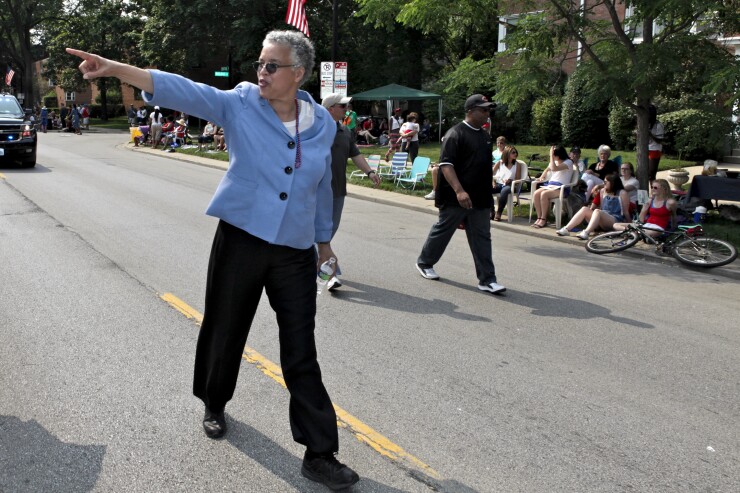CHICAGO – Cook County, Illinois, commissioners signed off on a $5.94 billion fiscal 2019 budget without new taxes or deep cuts.
“Whether making supplemental pension payments or being more judicious in our debt management, we have achieved much because we have avoided quick fixes in our previous budgets,” County Board President Toni Preckwinkle said in a statement. The county includes Chicago and surrounding suburbs.

The vote was unanimous although two members were absent. The fiscal year begins Dec. 1.
With the budget behind her, Preckwinkle will kick into high gear her campaign for Chicago mayor. She is one of a handful of high-profile candidates among more than a dozen announced candidates who want to succeed Rahm Emanuel, who announced in September he would not seek a third term in the February contest.
The county
Revenue growth of $52 million is projected in taxes and $8.8 million in collection efforts both of which helped offset the $82 million gap the county faced heading into budget season.
Preckwinkle has warned of difficult times ahead that will require tough management decisions because there’s little appetite to raise taxes among board members who rescinded an unpopular sweetened beverage tax last year over Preckwinkle’s objections. That tax was slated to bring in $200 million annually.
Healthcare and public safety consume 88% of the operating budget when capital, debt service, and pension related payments are excluded. Pension fund payments total $559 million, capital spending totals $459 million and bond and interest represents $285 million.
Although the property tax levy remains the same, lower general obligation debt service costs are freeing up some property tax revenue. The county has paid down its debt load by about 11% or $420 million since Preckwinkle took office in 2011.
The county expects to close out the current fiscal year with a nearly $300 million fund balance, down about $1 million from its target that is tied to the Government Financial Officers Association’s best practices recommendation that no less than two months of general fund spending be set aside.
The supplemental pension payments are made out of revenue from a 1% sales tax hike enacted in 2016. It will generate about $391 million in fiscal 2019.
The county uses the receipts for supplemental pension payments, to pay down debt, and to pay for transportation projects. Nearly $1 billion in supplemental pension contributions have been made while $107 million of debt has been paid down and $139 million has gone to pay for deferred transportation maintenance.
Budget documents warn of ongoing strains from the state’s fiscal woes and looming economic challenges.
As of August, the state owed the county $206 million in revenue for Medicaid fees, reimbursements for grants and adult probation related services. Expenses are expected to rise by $397 million between 2019 and 2023 while projected revenues are expected to grow by just $105 million.
“To prevent future structural deficits, the County will need to either reduce expenses, identify new revenues, or replace existing revenues with ones that grow at the rate of inflation,” the budget says.
The county’s finances could play prominently in the upcoming Chicago mayoral race because of the county’s structural balance and higher pension funding during Preckwinkle's almost eight years in office. She was not opposed Nov. 6 in the general election for a third term as county board president.
While Cook enjoys stronger ratings than Chicago and the state, it has taken hits since Preckwinkle took office with two of its ratings falling out of the double-A category.
Persistent pension pressures prompted S&P Global Ratings to
The county has about $3.5 billion of GO debt and $7.238 billion of unfunded liabilities, including retiree pension healthcare obligations, for a funded ratio of 56.7% in 2016, compared to $7.241 billion and a funded ratio of 55.4% in 2015.
Preckwinkle recently unveiled a five-year strategic plan for the county. The priorities provide insight into her likely goals for the city should she prevail in the mayoral contest. The plan outlines objectives and strategies in areas targeting community health, neighborhood economics and development, combating crime, neighborhood environmental improvements, and infrastructure projects.
Going forward, the county will adhere to a formal revenue estimating process after the board’s passage of an ordinance last month establishing an Independent Revenue Forecasting Commission. It takes effect in April.
The commission will consist of three members: two economists associated with universities in Cook County and one member of the public with expertise in public finance. Members will be appointed by the board president and confirmed by the board. The county’s finance chief will serve as chairman.
The county finance chief will submit by July 1 a proposed revenue forecast and the commission will be charged with reaching a consensus by Aug. 1. The ordinance was sponsored by outgoing Commissioner Jesus “Chuy” Garcia, who won election on Nov. 6 to the U.S. House of Representatives.
“The Civic Federation commends the sponsor…for working to establish the Independent Revenue Forecasting Commission as a first step to greater understanding of the county’s finances and better collaboration between the board and the president’s office,” the
The federation wants the county to take further steps. “The Civic Federation recommends that the County Board expand the scope of the Independent Revenue Forecasting Commission to examine an expenditure forecast along with the revenue forecast and identify potential solutions to limit the County’s annual spending increases,” the report read.





